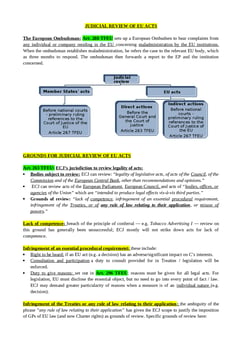C- 443/98 Unilever Italia v Central Food [2000] ECR I 7535
Judgement for the case C- 443/98 Unilever Italia v Central Food
Table Of Contents
-
(please read the Opinion of Advocate General Jacobs too – do you prefer the view of the Court or of the Advocate General?):
Italy brought in domestic regulations on food labelling, despite a directive requiring no legislation on the subject for a period.
-
Central Food refused to accept delivery of Unilever Italia’s product and Unilever Italia sued for breach of contract.
Central Food’s defence was that the product did not comply with the regulations Italy had brought in so it would be unlawful to accept delivery.
Unilever Italia argued that the regulations should not be applied since they were in breach of the directive. It said that the CIA ruling should be extended to failures to comply with delay procedures.
ECJ held that a national court is required, in civil proceedings between individuals concerning contractual rights and obligations, to refuse to apply a national technical regulation which was adopted during a period of postponement of adoption prescribed in a directive.
ECJ
It is clear from CIA that a law made domestically in breach of a rule set out in a directive leads to inapplicability of that law and there is no reason not to apply this in disputes between private individuals who contest a contract, just because CIA concerned competition law.
There is a difference between rendering a national law obsolete due to procedural defect (allowed) and allowing a directive to impose an obligation on another, giving it de facto horizontal effect (not allowed, following Marshall).
AG Jacobs (different approach to ECJ)
National legislation should not be rendered unenforceable in private contractual relations of this kind. To allow this would be to create great legal uncertainty, and would be unfair as it would penalise one of the parties to the contract for the state’s failure.
-
Also breach of a standstill clause of a directive (here) is different to breach of a notification clause (as in CIA) and therefore CIA wasn’t a direct precedent
(This last point is a bit crap - both have the effect of preventing a common market - he really just objects to the CIA ruling and wants to confine it).
In general AG Jacobs’ views make more sense.
RELATED CASES
For Further Study on C- 443/98 Unilever Italia v Central Food
Need instant answers? Our AI exam tutor is here to help.
Ask questions 🙋 Get answers 📔 It's simple 👁️👄👁️
Our AI is educated by the highest scoring students across all subjects and schools. Join hundreds of your peers today.
Get StartedSimilar Cases
Related Product Samples
These product samples contain the same concepts we cover in this case.
| European Law | Preliminary Reference Procedure Direct Effect Notes (53 pages) |

 Since 2010, Oxbridge Notes has been a trusted education marketplace, supplying high-quality materials from top achievers at universities like Oxford, Cambridge, LSE, Harvard, and Yale.
Since 2010, Oxbridge Notes has been a trusted education marketplace, supplying high-quality materials from top achievers at universities like Oxford, Cambridge, LSE, Harvard, and Yale.